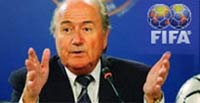FIFA president Sepp Blatter says clubs will never overshadow national teams
Money-spinning soccer clubs, especially in Europe, are unlikely to sound the death knell for national teams, the head of the sport's world body said Tuesday.

FIFA president Sepp Blatter told reporters there is a growing movement to stop the "overwhelming presence of non-national players" in different leagues and clubs, which would ensure that national teams remain a viable force.
"I cannot see that the national team will disappear in favor of club," said Blatter, who is in Kuala Lumpur to attend a women's soccer meeting organized by the Asian Football Confederation.
Blatter's comments are the latest salvo in his continuing tiff with the G-14 group of Europe's most powerful soccer clubs, which has criticized FIFA's plan to limit the number of foreign players, calling it illegal.
Under FIFA's proposal, each club would be allowed to field six home players plus five foreigners under the "6+5" formula.
Limits on the number of foreigners in European leagues were successfully challenged in 1995 when Belgian player Jean-Marc Bosman won a lawsuit there. The verdict in the case allowed EU players to compete in any European league, ending the practice of clubs charging transfer fees even after a contract had expired.
Blatter said it is ridiculous for some club teams to play with not a single local player, and cited the case of a recent match between Inter Milan and Juventus, in which there were only three Europeans in Milan's 11 and not one of them Italian.
FIFA is also at loggerheads with G-14 over the demands by the clubs that they should be compensated when players return injured from international duty. Some of the powerhouses in G-14 include Manchester United, Bayern Munich and AC Milan.
Blatter said soccer received a boost when FIFA scrapped its policy of rotating the World Cup among continents. The new policy, which will allow national soccer federations to bid for the tournament, will come into force in 2018 with a caveat -- federations in the continents that hosted the past two World Cups will not be allowed to bid.
This will rule out South America and Africa, as Brazil will host the World Cup in 2014 cup and South Africa in 2010.
Blatter said "it is absolutely tremendous" that a large number of soccer powerhouses have already said they want to host the 2018 tournament. England has confirmed it will bid.
It will likely face competition from Mexico, Canada, the United States, China, Australia, Russia, Spain and a joint bid by Netherlands and Belgium.
"It means football is a wonderful product. The World Cup is definitely the No. 1 (sporting) event in the world. It goes to a television audience that is far far (bigger than) for Olympic Games," he said.
Subscribe to Pravda.Ru Telegram channel, Facebook, RSS!


